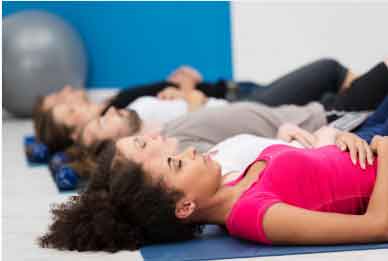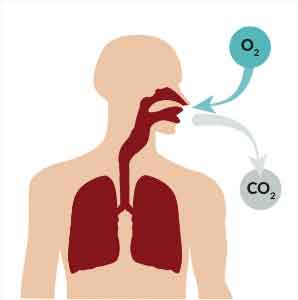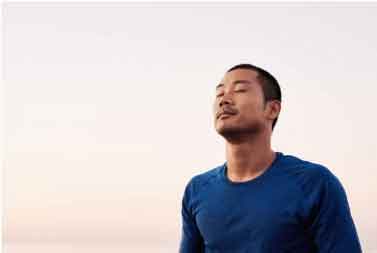Breathing is what we all do for a living, although none of us get paid for it. Perhaps we can say we get paid for it with life. Without taking breaths of fresh oxygen and other gases regularly, we would cease to exist.
The function of breathing however can be taken for granted majorly because the act itself is involuntary, except in health implicated cases where a person is unable to breathe on their own.
But a self-examination may expose how inefficient your lungs have become, and how weak your diaphragm is. Like a smithy’s blower, the lungs, and diaphragm are two organs that make breathing possible—lose their strengths over a long period of use.
Can I do breathing exercises after drinking water? Water helps immensely during and after breathing exercises. When you drink enough, it helps your body remain hydrated and prevents fatigue and tiredness that usually results from stress on the body. Not drinking sufficient water before exercise results in headaches, fatigue.
Hence it is very important to stay hydrated. Generally, you should drink water before, during, and after exercise. Our bodies thrive on this all-important, life-sustaining fluid. For breathing exercises though, you must apply caution.
How many glasses of water should you drink before breathing exercises?
For most strenuous breathing exercises, you will need to drink at least two glasses of water before beginning the routine, any more may lead to complications during exercise. Do not overdrink water before exercise as this may interfere with your exercise routine, defeating the benefits of water.
For breathing exercises, and depending on your weight and the purpose of the breathing exercise, just drinking one or two glasses of water is enough. When doing breathing exercises, the body is not using all the major joints and muscles, consequently, not much heat is generated and not much water is lost.
What you should consider before starting breathing therapy?
There are different types of breathing therapies. You should have a doctor examine the condition of your lungs and diaphragm before starting breathing therapy. A doctor’s diagnosis will help you determine what type of breathing exercise your lungs need, and the duration of each session, and so forth.
A doctor’s diagnosis may reveal that your lungs are weakened. This requires that you do breathing exercises for the lungs.
Or you may discover that certain breathing exercises appeal to you personally after a doctor gives you a clean bill of health. Below are different types of breathing exercises, each targeting different purposes.
Pursed lip breathing
This type of breathing exercise is useful for when you do certain strenuous activities, like lifting heavy objects, climb steps or bending to pick up heavy objects. And this is how it’s is done.
- Relax the muscles of your neck and shoulders.
- Close your mouth, inhale through your nose for 2 counts.
- Purse your lips the way you would if you want to whistle.
- Through your lips, exhale slowly up to 4 counts
Breath Focus breathing
This is deep breathing that helps strengthen the lungs and diaphragm. It is a breathing exercise that uses imagery, words, or phrases for concentration. These words or phrases range from the ones that make you happy, make you relax, or it can be any particular word or phrase you find soothing.
Harmony, love, peace, inner peace – like the one used by one of the characters in the Kungfu Panda animation.
Your focus will increase and solidify the more you practice. From five minutes per session, you can move to longer durations.
This is how to do it.
- Find a flat, comfortable place in your home.
- Lay on your back, or sit.
- Focus on your breathing without changing how you do it.
- Go from deep breaths to snatches of shallow normal breaths. As you do this observe the difference between the alternating breaths.
- Now use more deep breaths for maybe five minutes.
- Place a hand under your navel, observe how your belly behaves with every exhalation and inhalation.
- With each exhale, let out a big sigh.
- Personify each breath – some bring inner peace to you, while some inhalation brings love. Mentally affirm what each breath brings to you. Such imaginations are strong and reviving.
Try out Diaphragmatic breathing
According to BetterHelp, diaphragmatic breathing is explained as the type of breathing therapy that helps create the balance your body needs to maintain its oxygen levels while getting rid of carbondioxide.
This is the same as belly breathing and it is very beneficial to your health. For a healthy, strong diaphragm, do this deep breathing when you are relaxed and resting. At first, this technique can be tiring. But with time, your diaphragm and lungs will get accustomed to it.
This is how to do it.
- Find a flat place that is comfortable.
- Lie flat on your back, head on a pillow, and legs slightly bent at the knees.
- If you can’t hold the slightly bent knee, then put a pillow under it for support.
- Place one hand on your chest a little below your collar bone, and the other hand below your ribcage where you can feel the movement of your diaphragm.
- Slowly inhale with your nose, feel your stomach pressing your hand.
- Make sure your other hand is still on your chest.
- Tighten your stomach and exhale through pursed lips keeping your hand completely still on your chest.
For a beneficial degree of difficulty, place a book on you’re your abdomen. Try it while sitting, the more proficient you get the more you’d be able to do it while engaging in other activities during the day.
Consider the Lion’s Breath
This is a yoga breathing exercise. It helps to release tension in specific parts of the body, like the face and the chest. In yoga, it is also called a Lion’s pose, or simhasana sanskrit.
Importance of Breathing Therapy
As it turns out, we need the motivation to do most things in our daily lives. It is interesting to find that even breathing correctly adds to this motivation for all-day activeness. The importance of Breathing Therapy can not be overemphasized.
It is important to our overall health and for our organs to work efficiently throughout the day. Deep breathing exercises give the body a chance to solve its own problems.
Outlined below are a few of the noticeable benefits of breathing exercises.
Helps you deal with pain
The body has a large storehouse of endorphins, a natural painkilling hormone. When you do breathing exercises, you feel yourself relax after a while, that is endorphins going to work. The body releases these hormones when you deep breath dissolving pains in the body.
Improved Blood Flow
The more blood flows freely in the body, the likelier that toxins will be flushed out of the system. Since the diaphragm is situated midway through the body, exercising promotes the free flow of blood, flushing out toxins.
Lessens Anxiety
Breathing exercise helps you to reduce anxiety to the barest minimum. It helps to quell nervous and anxious feelings fast by slowing down the heart rate, balances the hormones in the body. The body releases more endorphins into the bloodstream and lowers the level of stress hormones cortisol.
Enjoy more immunity
Toxins damage our immunity, so does excess carbon dioxide in the bloodstream. Oxygenated blood ensures proper working of the organs of the body. Breathing exercises make more oxygen available to the body, toxins and carbon dioxide is exhaled.
Try breathing exercises when you are recovering from illness and enjoy faster recuperation; the body is able to absorb nutrients from food properly, a relaxed heart, all organs working in tandem giving you a general feeling of wellness.
Better Sleep
People dealing with lack of sleep can get great benefits from breathing exercises. Taking deep, slow, and alternating breaths can push the body into a relaxed state, detoxify it and make it calm so that a sleep state is attained easily.
If you suffer from insomnia, you can meet a therapist for more information on what other types of breathing therapy are can be helpful.
Improved and Better Posture
Research has shown that bad posture is an indication that you have not been breathing correctly, among other things. That is the reason why most recommendations to correct bad posture involve exercises that incorporate alternating deep-slow breathing.
When we exhale, the body is forced to straighten up, regularly doing this sure improves the posture. Straighter spine and shoulders are some of the benefits.
Increased Energy levels
This one is a no-brainer. With more oxygen in the blood, there’s bound to be more energy flowing through. Breathing exercises energize you for everyday activities. You are less likely to feel fatigued at the end of the day.
Improved Digestion
Once more it is pertinent to note that breathing isn’t a mere activity to keep us from suffocating. It is life. It is how our body is able to function properly. Even our digestion.
Deep breathing causes accelerated blood flow, which in turn warms up the digestive system and encourages the faster breakdown of food matter. The benefits of this are uncountable. It prevents constipation, and even more serious clogging of the digestive tract.
Reduction of inflammation
Breathing exercises reduce the acidity of the body, preventing cancerous tissue build-up. Stress increases the acid in the body, deep breathing reduces it. Hence breathing exercises can prevent cancers too.
A Good Detox
When we breathe in oxygen, we give off the waste called carbon dioxide, a toxic waste. The only way to get this toxic waste out of our system is by exhaling.
When breathing is too shallow, we continue to have harmful deposits of carbon dioxide in the bloodstream. This pollutes the blood. Breathing exercises help detoxify the body, heavy breathing eliminates the excess carbon dioxide inside the body.
Stronger Lungs
Breathing exercises help make your lungs stronger. This is much like when you exercise at the gym to build your muscles to make them bigger and stronger.
Of course, the lungs do not become bigger like our biceps and triceps, but they do work more efficiently. They are better able to support deep breathing on their own, expunging potentially toxic carbon dioxide from the alveoli.
Improved Heart Health
The heart gets a maximum share of oxygen with every gulp of oxygen through breathing exercises. The benefits are invaluable. This is the heart we are talking about here. The stronger the heart the better for the rest of the body. The cells of the heart get more oxygen and function well when we do deep breathing exercises.
Improved Weight Management
Deep breathing exercises help your body burn fat more efficiently. The more exercises you get, the more oxygenated your cells and muscles. If you are overweight, breathing exercises are recommended along with other exercises. Watch your weight management game improve dramatically with this exercise.
For Weight Gain too
Conversely, underweight people can gain weight with the use of breathing exercises. Muscles and organs may not be lean when they are not getting sufficient oxygen. Deep breathing reverses this situation.
Improved Stamina
Among other things, stamina depends much on oxygenated cells in the body. The more oxygen gets to the cells the more strength the body accumulates for daily activities.
Cell Regeneration
The cells in our body require energy for their life cycle. They live for a time, and then they die. In order for them to function properly, they need a steady supply of oxygen. Moreover, it is the body itself that is breaking down cells and making new ones. Deep breathing can help the body do this work more efficiently.
Prevents Shortness of Breath
Shortness of breath occurs when the lungs are not adequately filled up with oxygen when we breathe. Shallow chest breathing seldom fills the lungs. Deep breathing exercises can correct this phenomenon, teach the lungs to take more breath.
The benefits of deep breathing exercises are too numerous to state them all here. Exercises that incorporate deep breathing give the body overall advantages.
It is important that you check with a doctor though before adopting an exercise regimen especially if you suffer from certain ailments in order to be on the safe side. Finally, it is recommended that you drink some water before, during, and after exercises.








No Comments